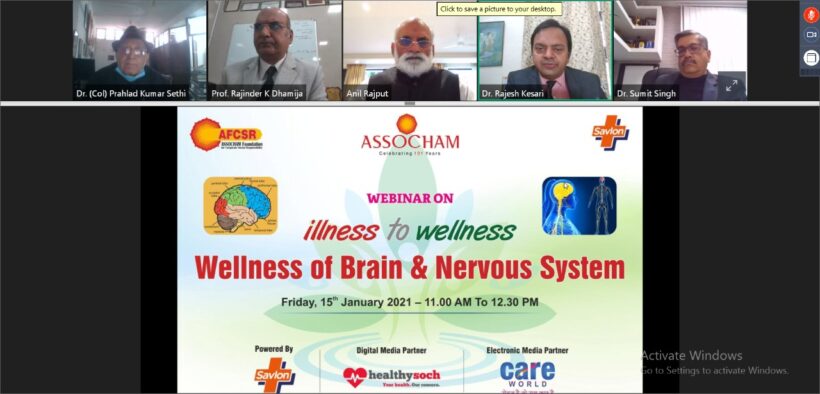The online event saw an expert panel of neurologists’ participation hold an informative dialogue on challenges faced by patients suffering from a weak nervous system.
The Associated Chambers of Commerce and Industry of India (ASSOCHAM), one of the apex trade associations of India successfully organized another edition of the ‘Illness to Wellness’ series themed ‘Wellness of brain and nervous system’.
Supported by top hygiene brand SAVLON, the program which promotes healthy living with a focus on wellness and preventive health through healthy habits, diet, exercise, and holistic health saw the veteran speakers discuss at length what affects nervous system related problems and how the same can be improved.
Renowned experts who shared their valuable comments included – Prof (Dr) Rajinder K. Dhamija, Head of Neurology Department, Lady Hardinge Medical College; Dr (Col) P.K. Sethi, Emeritus Consultant and Advisor, Neurology, Sir Ganga Ram Hospital; Dr Sumit Singh, Chief, Neurology, Artemis Hospitals; Mr Anil Rajput, Chairperson, ASSOCHAM CSR Council and Dr Rajesh Kesari, Founder and Director, Total Care Control who also moderated the ASSOCHAM webinar.
The panellists explained the importance of a healthy brain and central nervous system and minimise chances of neurological disorders.
Sharing his views, Dr Dhamija said, “As the pandemic rages, there is an urgent need to establish neuropathological links in COVID-19 via autopsies and pathology studies. Knowledge of virus structure and virus-host interaction mechanisms will aid in providing a framework for therapeutic interventions.”
He added, “Neurological manifestations in COVID-19 are undeniable and represent an amalgamation of a hyperfunctioning immunological system, procoagulant state and direct virus-induced apoptosis, a combination that may require a multi-pronged approach for therapeutic success.”
He also said, “Neurological disorders have become major public health concerns globally including India, with increasing prevalence due to escalating longevity and perpetually changing lifestyles.”
Stating that brain diseases, along with mental disorders and substance abuse, cause more morbidity and mortality than cancers and heart diseases combined, he said that key to improvement is creating awareness, leading to timely diagnosis and treatment.
Sharing certain figures, he said, “There has been a 44 per cent increase in mental, neurological, and substance use disorder burden from 1990 to 2013 in India, by far exceeding many other Asian countries. This burden is estimated to increase further by 23 per cent in India by 2025, which should ring alarm bells to the medical community.”
Addressing the delegates, Dr Sethi said, “Healthy brain and mind leads to good physical health and happiness. The motto of life should be to achieve happiness.”
Dr. Sumit sharing his views said, “Migraine, tension-type headache, trigeminal autonomic cephalalgias are the common primary headache. Headache may be secondary to trauma, substance abuse/ withdrawal, infection, a vascular disorder, etc. If the headache is new in onset, precipitated by exertion, cough, worse than or different in nature than the previous headache, associated with fever, fits, or appears in the elderly for the first time; they should be taken seriously, and immediate medical attention should be sought. Radiological investigations like MRI usually helps to rule out any underlying structural disease. The majority of the headaches can be treated with appropriate and timely medication.” Mr. Rajput in his address impressed upon the need for leading an active physical life which may include walking, jogging, cycling, resistance training along with mental well-being through yoga, meditation, and counseling that can make everybody better equipped to take on many of the health challenges be it neurological disorders or Covid-19.

